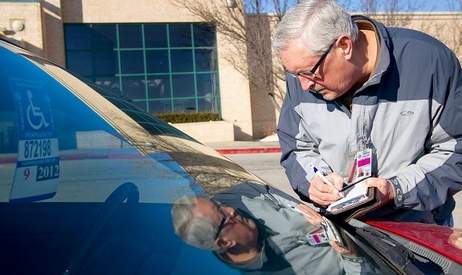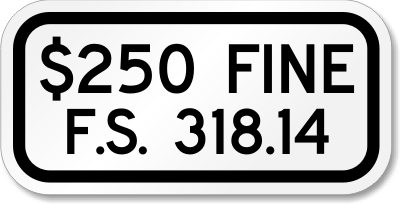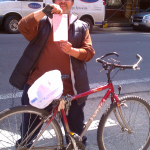Volunteer handicap parking enforcement is helping, but is it wrong?
In Boynton Beach and other cities, volunteers have taken over the task of investigating and issuing handicap parking violations. But is this really a good idea? (Via Media Dis&Dat.)
We’ve groused about able-bodied drivers parking in disabled parking spots for months – ever since we read about the brazen scofflaws of Washington, D.C. last spring, and learned just how widespread parking fraud is – but it seems like an intractable problem that’s exacerbated by the sheer number of placards floating around.
In order to take the burden off the government, most states give doctors wide discretion in determining who does and doesn’t qualify for the precious placards, resulting in permits being issued in numbers that just don’t square with the number of people with disabilities.
To compound enforcement issues, asking people on the spot why they have a permit can be a sticky problem, inviting civil litigation when people with legitimate but hard-to-spot disabilities park as they’re entitled.
Life isn’t so bad in Boynton Beach, Florida (via bunnygoth).
Florida township Boynton Beach has taken an unorthodox approach to the problem, creating a volunteer task force of 13 retirees, complete with uniforms and a marked vehicle. According to the Sun Sentinel, the squad has issued over $300,000 in tickets per year, many to spouses and family members using placards illegally, but also to people holding expired permits, and to people who just parked in the wrong place. What’s more, according to the article, at least one of the enforcement specialists is himself disabled.
Able-bodied people who break the law by parking in handicapped parking spots in Boynton Beach risk a $250 fine. Apparently, though, enforcement was an issue before volunteers took up the slack from the local PD (via MyParkingSign.com).
Volunteer enforcement agents seem like a great solution – and recruits with disabilities even better. Even though the article mentions irate ticketees, lawbreakers probably respond better if they realize they’re yelling at someone who is disabled themselves – someone who needs the accessible parking that they are illegally occupying.
Overall, a heartwarming story, right? Except it’s caused a little bit of a contretemps around our office. Here’s the disagreement.
The dissenters
According to one view, while the effort is laudable (and of course no one here will argue in favor of violating the Americans with Disabilities Act), it’s a little disturbing that this is unpaid work. Raising $300,000 in revenues for Boynton Beach per year while receiving only satisfaction of “giving back to his community” as recompense is a tough deal for the subject of the article, William Horn, as well as the other volunteers.
The total revenue earned breaks down to over $20,000 per volunteer, a little over minimum wage (and these volunteers probably aren’t working 40-hour weeks).
We find ourselves wondering, as he goes about his very difficult job, does Horn have healthcare coverage in case of on-the-job accidents (not unlikely, since parking lots aren’t the safest places)? Traffic and parking enforcement are notoriously stressful jobs – does Horn have the opportunity to decompress a little and shoot the breeze with the local cops whose jobs he’s doing?
According to this view, the benefit of being a paid worker rather than a volunteer when you’re talking about law enforcement isn’t just the cash, it’s the security of knowing that your employer will have your back if something unfortunate happens on the job. Paying these men and women also communicates that the municipality takes the law seriously, and will enforce it even if volunteers dry up for some reason. Paying these workers also gives them an official status – it says that they’ve had training and their efforts are worth municipal resources.
After all, how would it go over if a municipality said, “We’re all for women voting, but we’ll only enforce the Nineteenth Amendment if our town can get together a few retirees to do all the legwork?” How would it go over if Boynton Beach decided it could save even more money by issuing tickets for other infractions on a volunteer basis – if it started getting volunteers to check meters, or frisking outdoorsmen for licenses? Where exactly does the line get drawn (and crossed), anyway?
This slippery slope in Boynton Beach has an alligator at the bottom. Coincidence?
The traditionalists
According to a vocal minority around our office, volunteer parking enforcement isn’t just legitimate, it’s a great idea. It’s hard to tell municipalities in cash-strapped regions to spend more. Maybe the calculus is such that even hiring six full-time enforcement workers at $50,000 per year wouldn’t pay for itself – maybe the retirees who man the volunteer parking brigade do a better job because they’re motivated by justice rather than cash.
If a law is being enforced (but badly), it’s perfectly reasonable to look to people with time and motivation to fill in the gaps. If they’re making money for their cities, well, there’s certainly nothing wrong with that – groups of private citizens that clean up stretches of highway or pitch in after natural disasters are filling in for government, in a sense, and no one complains.
Enforcing disabled parking laws is admittedly time-consuming work – you have to wait around for the person who’s parked to come out to their vehicle, and most cops have better things to do with their time, like helping to prevent violent crimes.
According to this view, to tell citizens that they can’t take part in the processes of justice is to stem a valuable impulse. Our juries are made of our peers, after all. The American tradition of self-reliance and cooperation isn’t worth a whole lot if even the smallest effort has to be subordinated to paperwork, wage requirements and liability law.
Do we ask our neighbor to pony up so we can mow their lawn if they’re sick? Do we insist they sign a waiver if they offer to feed our cat while we’re on vacation? Of course not, and for the same reasons, having a volunteer force doing the ticketing supports the finest tradition of civic-mindedness. It’s undeniable that the task force make the ADA regulation more effective in Boynton, and it’s a law that’s in place for very good reason: protecting the rights of disabled citizens, helping to ensure that they have safe and equal access.
What do you think? Let us know in the comments.
-C. Lumm
Related Posts
Category: No Parking, Regulations
























